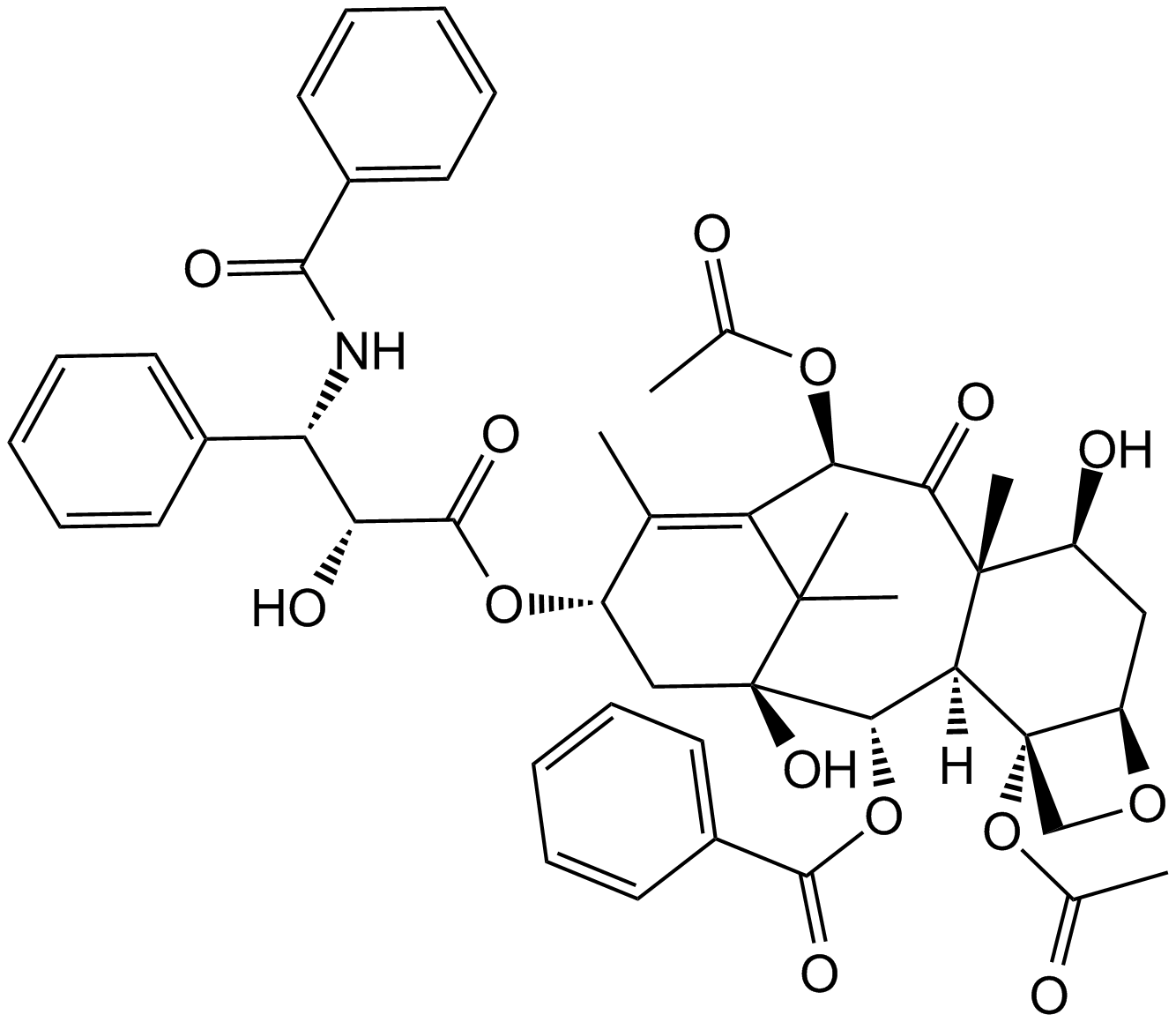Paclitaxel (Taxol) (Synonyms: NSC 125973) |
| Catalog No.GC12511 |
A potent mitotic inhibitor
Products are for research use only. Not for human use. We do not sell to patients.

Cas No.: 33069-62-4
Sample solution is provided at 25 µL, 10mM.
Paclitaxel, from the bark and needles of Taxus brevifolia, is a tricyclic diterpenoid compound. Paclitaxel can promote the assembly of tubulin into microtubules and prevent the dissociation of microtubules, blocking cell cycle progression, preventing mitosis, and inhibiting the growth of cancer cells.[1]
In vitro, paclitaxel significantly inhibited the proliferation of ATC cells in a dose-dependent manner; the IC50 value ranged from 1.99 to 9.97 nM.[6] Encapsulating paclitaxel into nano-drug carriers, the water-solubility, selective delivery to cancers, tissue toxicity, controlled release and pharmacokinetic property of paclitaxel are improved, can improve its toxicity to human, keep or enhance its activity and improve its pharmacokinetic property.[2] In vitro, in a short time, exposures to paclitaxel induced the phosphorylation and degradation of IkappaB-alpha, which in turn caused the activation of NF-kappaB in both human breast cancer BCap37 and human epidermoid carcinoma KB cells. [3] In addition, Paclitaxel can increase its cytotoxic effect by the loading of Paclitaxel to autologous prostate cancer cell-derived EVs.[5]
In vivo experiment it shown that treatment with 1 mg/kg and 20 mg/kg paclitaxel, the light-colored spotted metastases were dramatically increased in livers from the low-dose paclitaxel-treated mice and the metastasis was substantially reduced in the high-dose paclitaxel group.[4] In vivo, the growth of C643 cell-derived xenograft tumors in the lenvatinib-treated (5 mg/kg; p.o.) and paclitaxel-treated (5 mg/kg;i.p.) groups was slower than that in control group.[6]
References:
[1]Zhu L, Chen L. Progress in research on paclitaxel and tumor immunotherapy. Cell Mol Biol Lett. 2019 Jun 13;24:40.
[2]Chen S, et al. Recent Development of Copolymeric Nano-Drug Delivery System for Paclitaxel. Anticancer Agents Med Chem. 2020;20(18):2169-2189.?
[3]Dziadyk JM, et al. Paclitaxel-induced apoptosis may occur without a prior G2/M-phase arrest. Anticancer Res. 2004 Jan-Feb;24(1):27-36.?
[4]Li Q, et al. Low doses of paclitaxel enhance liver metastasis of breast cancer cells in the mouse model. FEBS J. 2016 Aug;283(15):2836-52.
[5]Saari H, et al. Microvesicle- and exosome-mediated drug delivery enhances the cytotoxicity of Paclitaxel in autologous prostate cancer cells. J Control Release. 2015 Dec 28;220(Pt B):727-37.?
[6]Jing C, et al. Lenvatinib enhances the antitumor effects of paclitaxel in anaplastic thyroid cancer. Am J Cancer Res. 2017 Apr 1;7(4):903-912.
Average Rating: 5 (Based on Reviews and 30 reference(s) in Google Scholar.)
GLPBIO products are for RESEARCH USE ONLY. Please make sure your review or question is research based.
Required fields are marked with *




